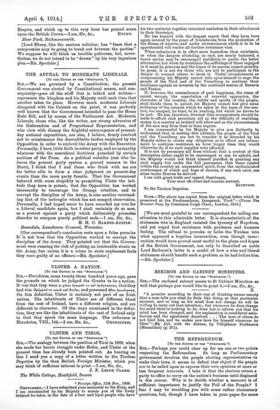ULSTER AND TIROL ['To me Enrsoa or roe "Bracratore] SIR,—Tlie
analogy between the position of Tirol in 1809, when she made her heroic struggle under Hofer, and Ulster at the present time has already been pointed out. As bearing on this I send you a copy of a letter written to the Tirolese Deputies by the then British Foreign Minister, which you may think of sufficient interest to print.—I am, Sir, J. F. LEIGH CLARE.
The White Cottage, Heathfteld, Sussex.
"Foreign Office, 11th Nov.. 1809.
,O-ntrriaminie,—I have submitted your memorial to the King, and I am commanded by bis Majesty to assuT you of the lively interest he takes in the fate of a free and loyal people who have for two centuries together remained unshaken in their attachment to their Sovereign.
He has learned with the deepest regret that they have been again severed by the peace of Schonbrunn from the protection of the House of Austria, and under circumstances which it is to be apprehended will render all further resistance vain.
When submission is in effect more hazardous than resistance, or when the dangers attending on each are nearly balanced, a brave nation may be encouraged justifiably to prefer the latter alternative, but when by resistance the sufferings of those engaged in it must be grievous and the hopes of its success cannot possibly be great, it is not for those who are not to participate in the danger to counsel others to incur it. Under circumstances so compromising his Majesty cannot take upon himself to urge the people of the Tirol and of the Vorarlberg to continue their resistance against an invasion by the combined armies of Bavaria and France.
If, however, the remembrance of past happiness, the sense of recent wrongs, the expectation of renewed oppression, the character of the country, the habits and spirits of the people, shall decide them to persist, his Majesty cannot but give some testimony of the interest which he takes in the issue of the con- test, too unequal, he fears, to be availing, but which he knows to be just. He has, therefore, directed that arrangements should be made to afford such pecuniary aid as the difficulty of remitting money to a country so isolated will allow and as the circumstances of the case may from time to time require.
I am commanded by his Majesty to give you distinctly to understand that, in making this advance, the people of the Tirol and the Vorarlberg are not to consider it as intended by his Majesty either to create any obligation or to afford any induce- ment to continue resistance an hour longer than they would otherwise do, if no such supplies were afforded.
It is not by pecuniary aid from without that a contest of this description either ought to be encouraged or can be upheld, and his Majesty would not think himself justified in granting any such supply but under the full persuasion that there existed within the country an unquenched spirit, from the undiminished continuance of which any hope of success, if any such exist, can alone under Heaven be derived.
I am with great truth and regard, Gentlemen, Nora.—The above was copied from the original letter which is preserved at the Ferdinandeum, Innapruck, TiroL"—(From The Brenner Pass, by Constance Leigh Clare; London, 1912.)
[We are most grateful to our correspondent for calling our attention to this admirable letter. It is characteristic of the statesmen who in England resisted the tyranny of Napoleon, and yet urged that resistance with prudence and humane feeling. The refusal to provoke or bribe the Tirolese into what appeared a hopeless insurrection, even though insur- rection would have proved most useful to the plans and hopes of the British Government, can only be described as noble Lord Bathurst's letter is a model of how a wise and liberal statesman should handle such a problem as he had before him. —ED. Spectator.]














































 Previous page
Previous page